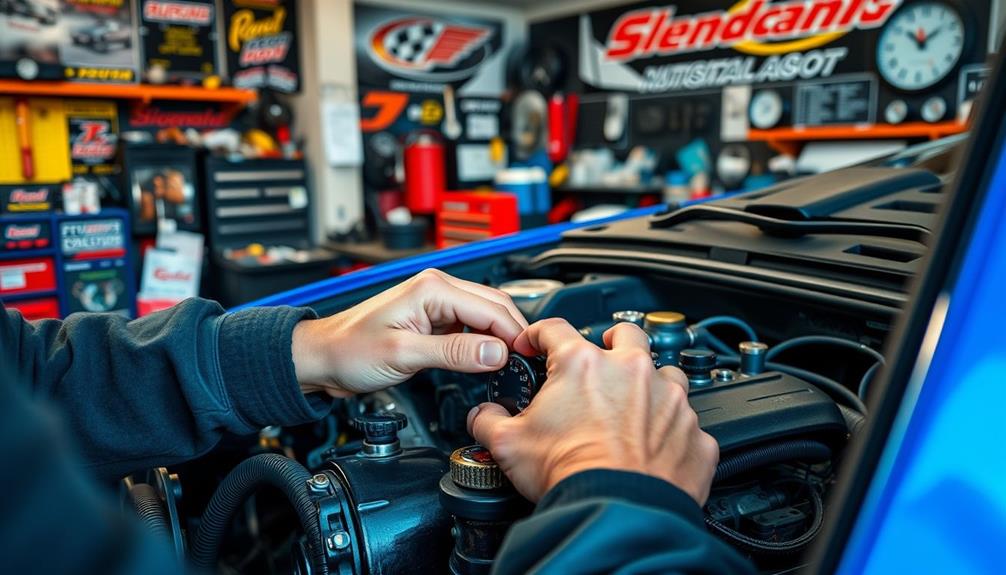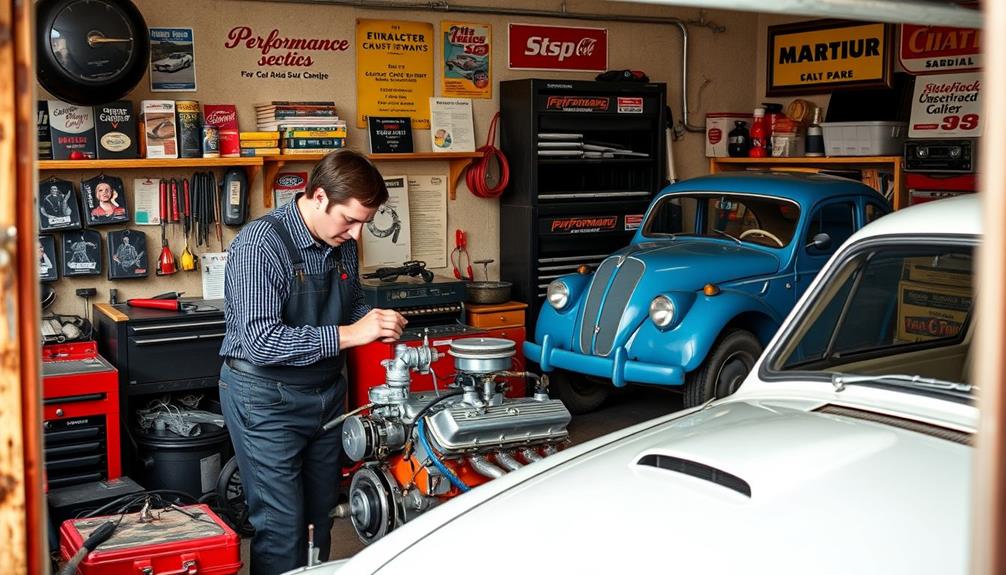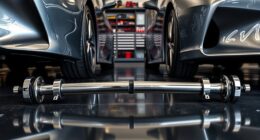To learn car tuning from scratch, start by grasping the basics of internal combustion engines and tuning principles. Focus on understanding engine parameters like duty cycles and air-fuel ratios, which are essential for performance tweaks. Get hands-on experience by working on personal projects or helping friends with their vehicles. Engage with the community through local meets, workshops, and online forums to gain insights and support. Consider enrolling in online courses for structured learning. With dedication and practice, you can master the art of tuning and enhance your vehicle's performance. Discover more tips and resources to boost your journey ahead. Investing in quality tools and equipment will also be crucial to your journey in mastering car tuning basics. Additionally, staying updated with the latest technology and trends in the automotive industry will help refine your skills and knowledge. Remember that patience and perseverance will be key as you navigate through the complexities of car tuning. With the right mindset and continuous learning, you will be able to achieve your goals and create impressive results.
Key Takeaways
- Understand engine basics, including duty cycles, timing, and ECU functions, to build a solid foundation for tuning.
- Gain hands-on experience through practical projects, working on vehicles, and using tuning software to apply theoretical knowledge.
- Engage with the automotive community by attending local meets, workshops, and online forums for insights and support.
- Utilize online courses and recommended reading materials to deepen your understanding of tuning techniques and strategies.
- Master tuning tools like ECU remapping and monitor performance metrics to effectively optimize engine performance.
Tuning Misconceptions Explained
When it comes to car tuning, many folks often get caught up in the myth that it's an inherent talent. The truth is, tuning is more of a science than a mystical gift. If you immerse yourself in the tuning industry, you'll discover that understanding engine operation and electronic fuel injection (EFI) systems is essential for effective tuning.
It's about grasping the mechanics behind how engines work and applying that knowledge. You don't need to be a math whiz; basic arithmetic skills are all you need for calculations related to tuning adjustments. The real key lies in your ability to tackle problems and develop a foundational knowledge of engine mechanics.
By addressing these misconceptions and focusing on the learnable aspects of tuning, you can become a competent tuner over time. Instead of believing that only a few are naturally gifted, recognize that anyone can master the art of tuning with the right education and hands-on experience.
Essential Skills for Tuners
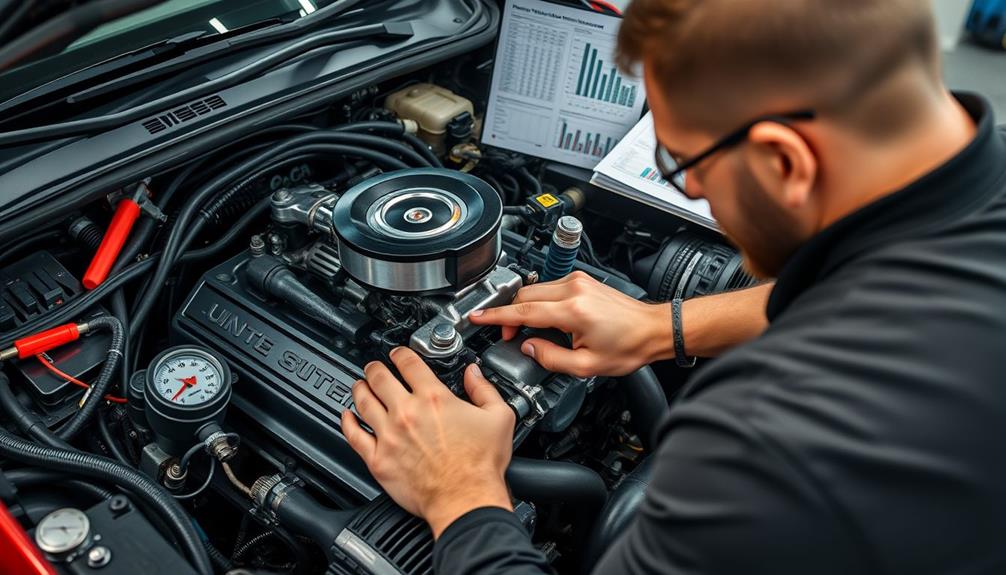
To become a successful tuner, you need a solid grasp of engine mechanics, as it's the backbone of performance tuning.
Analytical problem-solving skills are essential for diagnosing issues and making precise adjustments.
Gaining practical experience through hands-on projects will help you apply what you've learned and enhance your skills.
Basic Engine Knowledge
A solid grasp of basic engine knowledge is essential for anyone looking to excel in car tuning. Understanding the crucial components of internal combustion engines, including the differences between naturally aspirated and turbocharged engines, will lay the groundwork for effective tuning.
You'll need to familiarize yourself with key engine parameters like duty cycles, timing, and temperatures, as well as the role of the ECU in managing performance.
Adjusting critical components, such as fuel delivery and ignition timing, is crucial for optimizing engine performance and efficiency. You should learn how these factors influence the air-fuel ratios and how adjustments can lead to significant performance gains.
Engaging in hands-on projects with vehicles can provide practical experience that deepens your understanding of engine dynamics.
Utilize well-reviewed books and automotive magazines to supplement your learning. While basic problem-solving skills and a grasp of arithmetic are necessary for calculations related to tuning, you don't need advanced mathematics to succeed.
With dedication and practice, you'll be well on your way to mastering the art of performance tuning.
Analytical Problem-Solving Skills
Effective analytical problem-solving skills are essential for tuners, as they empower you to identify and fix tuning issues by carefully evaluating engine performance data. By honing these skills, you can pinpoint discrepancies and determine the necessary adjustments to optimize your vehicle's performance. Basic arithmetic is all you need to handle calculations related to air-fuel ratios and timing settings.
Understanding engine mechanics and EFI systems is vital. This knowledge enhances your analytical skills, enabling you to make informed decisions based on engine behavior during tuning sessions.
Data logging plays a significant role in this process, as it allows you to collect and analyze performance data, helping you diagnose issues more effectively.
As you face various tuning challenges, practicing your analytical problem-solving skills will lead to greater competence in diagnosing complex situations. Continuous learning is key; the more you engage with engine performance data and trends, the more confident and effective you'll become as a tuner.
Embrace this journey, and you'll find that your analytical prowess not only improves your tuning abilities but also elevates your overall understanding of automotive performance.
Practical Experience Importance
Practical experience is what truly bridges the gap between theory and application in car tuning. Engaging in hands-on projects with vehicles allows you to apply your theoretical knowledge and develop practical skills essential for effective tuning.
Whether you're tweaking your own car or working on a friend's, each project gives you invaluable insights into the mechanics of tuning.
Participating in automotive forums and workshops also enhances your learning experience. You can gain insights from seasoned tuners and share your own challenges and successes, which fosters a supportive community.
Familiarity with basic engine mechanics, like fuel delivery and ignition timing, is vital for diagnosing and resolving tuning issues effectively.
Don't forget to invest time in regular practice. Experimenting with tuning software and tools, such as OBD-II scanners and dynos, will help build your competence and confidence.
Staying updated with well-reviewed tuning books and automotive magazines is also essential; they keep you informed on current trends and techniques in the tuning world.
Learning Resources and Courses
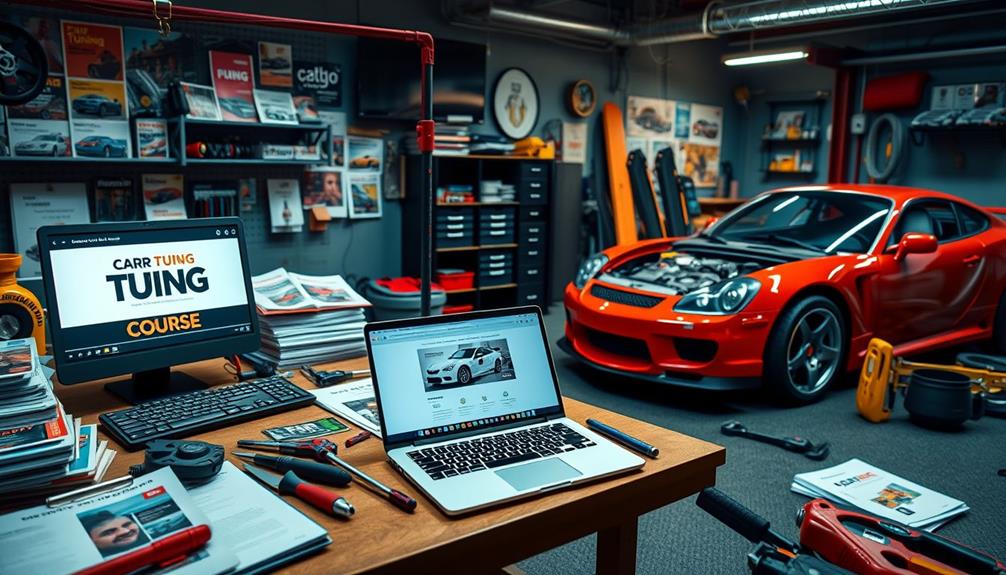
When you're ready to enhance your car tuning skills, online courses like those from Evans Performance Academy offer a great starting point.
These courses cover everything from EFI Basics to advanced techniques, making them suitable for any enthusiast.
Don't forget to check out well-reviewed books and magazines to stay informed and deepen your understanding of engine tuning.
Online Courses Availability
Have you considered diving into the world of car tuning through online courses? These programs are perfect for both beginners and experienced tuners, focusing on core principles to guarantee you gain a thorough understanding of engine tuning.
One standout option is the Evans Performance Academy, which offers a variety of courses ranging from EFI Basics to Advanced EFI.
You'll find that online courses provide:
- Step-by-step guidance on tuning processes, making it easier for you to grasp complex concepts.
- Detailed explanations of programming, helping you connect theory with real-world applications.
- FREE content, like a 12+ hour sample EFI training course, allowing you to assess the teaching style before committing.
Additionally, many courses come with refund policies if they don't meet your expectations.
Plus, referral programs can reward you and your friends with discounts, making it even more enticing to start learning.
Recommended Reading Materials
To enhance your car tuning skills, a variety of well-respected reading materials and courses await your discovery. Start by purchasing books like "Tuning Engine Management Systems" or "How to Tune and Modify Engine Management Systems." These resources provide foundational knowledge and practical insights into engine tuning.
Additionally, subscribing to automotive magazines such as Hot Rod and Car Craft keeps you updated on current trends and tuning tips. Online forums like NASIOC for Subaru enthusiasts also offer community support where you can share experiences and gather advice.
For structured learning, consider engaging with online courses offered by Evans Performance Academy. They cover a range of topics from EFI Basics to Advanced tuning techniques, suitable for every skill level. Don't forget to explore free sample courses, like the 12+ hour EFI training session, to gauge your interest before fully committing.
Here's a quick comparison of resources:
| Resource Type | Example |
|---|---|
| Books | "Tuning Engine Management" |
| Magazines | Hot Rod |
| Online Forums | NASIOC |
| Online Courses | Evans Performance Academy |
These recommended reading materials and courses will greatly enhance your car tuning journey.
Discounts and Promotions Overview
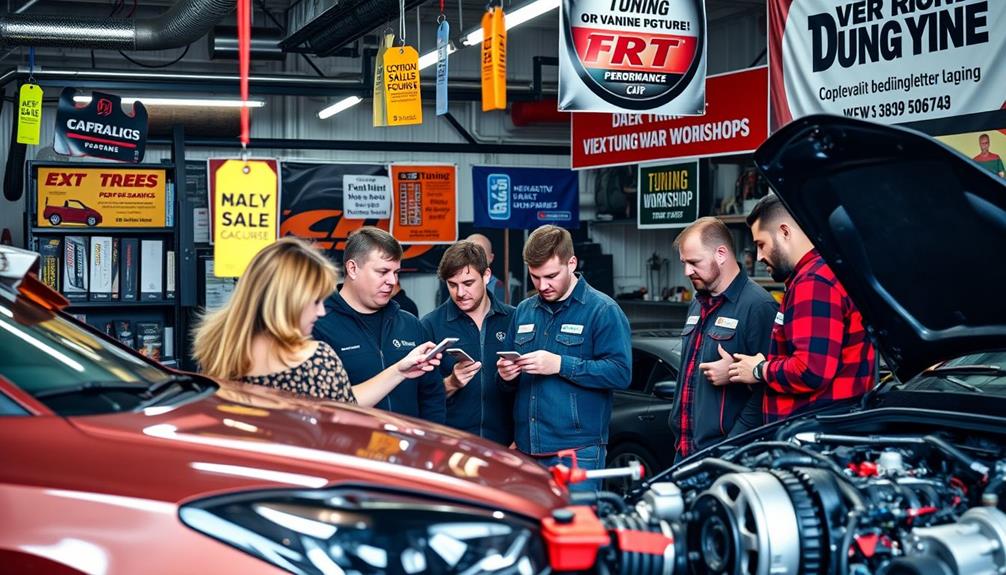
Wondering how to make your car tuning education more affordable? You're in luck! There are fantastic discounts and promotions that can help you immerse yourself in your first course without breaking the bank.
For first-time enrollees, you can snag a $50 discount, making it easier to start your learning journey. Plus, you don't even need a coupon—just sign up and enjoy the savings!
By taking advantage of these promotions, you can access:
- Exclusive FREE content that enhances your understanding of car tuning.
- A referral program that rewards both you and your friends with additional discounts, fostering a sense of community.
- Regular promotions that provide financial incentives to keep you engaged in your learning experience.
With quick inquiry response times, typically within 12 hours, you can easily get the information you need about ongoing promotions.
Engaging With the Tuning Community

Connecting with the tuning community can greatly enhance your learning experience and provide practical insights that textbooks alone can't offer. Engaging with local car meets and workshops gives you hands-on experience and direct interaction with knowledgeable individuals.
These gatherings facilitate valuable networking opportunities, allowing you to build relationships with fellow enthusiasts and experts.
Online forums dedicated to specific car models serve as excellent platforms for sharing insights and troubleshooting advice. You can connect with seasoned tuners who can guide you through your projects.
Social media groups on platforms like Facebook and Reddit are also thriving hubs where you can discuss tuning techniques, share your progress, and receive encouragement from others in the tuning community.
Attending automotive expos and tuning events is another fantastic way to immerse yourself in this world. You'll learn about the latest technologies, meet industry professionals, and witness tuning demonstrations in real-time.
Additionally, participating in collaborative projects with fellow tuners can considerably enhance your learning experience. By sharing skills and knowledge, you create a supportive environment that fosters mastery of tuning techniques.
Understanding Engine Basics

Understanding the basics of an engine is fundamental for any aspiring tuner. Familiarizing yourself with internal combustion engine components, particularly the differences between naturally aspirated and turbocharged engines, will set a solid foundation for your tuning journey.
To visualize this, consider:
- The rhythmic pulsing of pistons in a well-tuned engine.
- The precise timing adjustments that can release hidden power.
- The seamless flow of air-fuel mixtures through optimized fuel delivery systems.
Key engine parameters—like duty cycles, timing, and temperatures—are essential for optimizing performance through tuning adjustments. You'll need to dive deep into how the engine control unit (ECU) manages these functions.
The ECU is the brain of the operation, controlling critical components such as fuel delivery and ignition timing, which are imperative for enhancing power and responsiveness.
Also, don't overlook the influence of exhaust systems on back pressure and engine airflow, as these factors can greatly affect performance.
Practical Experience and Applications

To truly grasp car tuning, you need hands-on experience with tuning projects that let you apply what you've learned.
Engaging with online communities and resources can also enhance your understanding and provide support as you tackle new challenges.
Hands-On Tuning Projects
While diving into hands-on tuning projects with your vehicle, you'll find that practical application of tuning principles greatly enhances your grasp of engine dynamics and performance upgrades. Engaging in these projects allows you to experiment and see results firsthand, solidifying your understanding of engine tuning.
Consider starting with these modifications:
- ECU remapping to optimize fuel and ignition settings for better efficiency.
- Air intake upgrades to increase airflow and improve throttle response.
- Exhaust system enhancements to reduce back pressure and boost horsepower.
Collaborating with local automotive clubs or online forums can also enrich your experience. You'll gain insights from seasoned tuners while working on real vehicles.
Utilizing workshop manuals and well-reviewed books provides guidance through specific tuning techniques, ensuring you tackle each project with confidence.
As you experiment, document your tuning projects, noting the challenges you face and the solutions you implement. This not only reinforces your learning but also creates a valuable reference for future modifications or repairs.
Embrace the hands-on approach, and you'll master the art of performance tuning in no time!
Community Engagement Opportunities
Hands-on projects can only take you so far without the support and insights of a community. Engaging with online forums dedicated to specific car models helps you tap into invaluable community engagement. You'll find experienced tuners sharing their knowledge, troubleshooting techniques, and innovative ideas that can elevate your learning experience.
Additionally, fostering a digital-friendly environment at home can enhance your approach to learning car tuning, as you integrate technology into your projects and discussions with others in the field resources available for parents.
Participating in local car meets and workshops offers direct interaction with knowledgeable individuals in the automotive field. These gatherings foster networking opportunities and mentorship, allowing you to learn from those who've honed their skills over time.
Joining automotive clubs or groups focused on tuning not only enhances your learning experience but also opens the door to collaborative projects. You'll gain access to the collective wisdom of fellow enthusiasts enthusiastic to share tips and tricks.
Creating a personalized garage on tuning websites can also facilitate community engagement, as it allows you to track vehicle modifications and performance metrics. By sharing your projects and experiences, you contribute to a vibrant community while gaining insights that can greatly boost your tuning skills.
Embrace these opportunities, and you'll be well on your way to mastering the art of car tuning.
Utilizing Online Resources
Leveraging online resources can greatly enhance your car tuning journey by providing access to a wealth of knowledge and practical applications. You can explore various platforms that offer everything from video lessons to exclusive FREE content, making your learning experience both extensive and engaging.
- Join online forums dedicated to your specific car model, where seasoned enthusiasts share tuning techniques and modifications.
- Subscribe to automotive magazines like Hot Rod and Car Craft for the latest trends and innovations in performance enhancements.
- Utilize well-reviewed books on engine tuning that balance theory with practical applications, helping you grasp essential tuning principles.
Additionally, don't forget to participate in hands-on projects. Work with selected vehicles that have strong community support, allowing you to apply what you've learned in real-world settings.
Tuning Techniques and Strategies
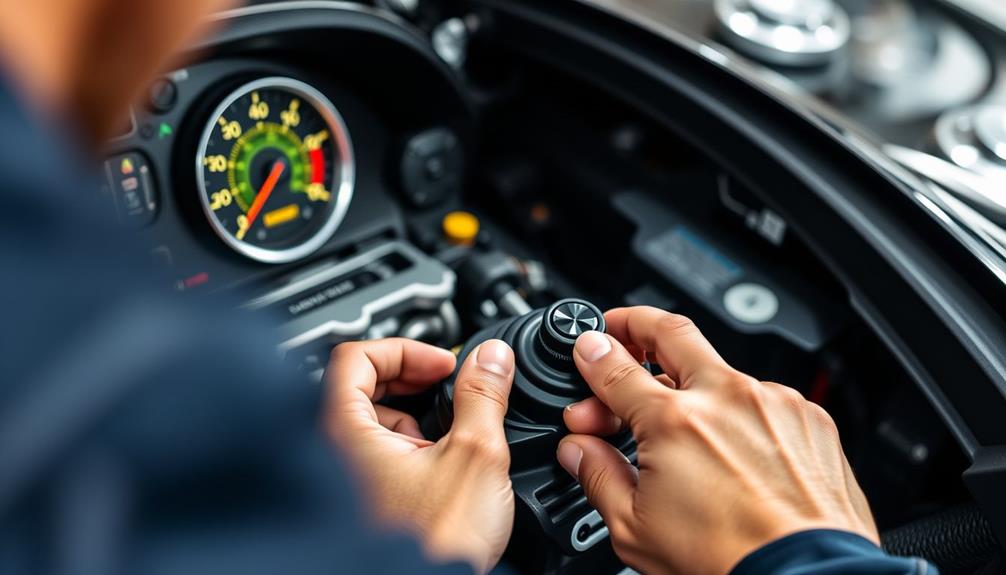
When you plunge into car tuning, mastering the right techniques and strategies is essential for optimizing performance. One of the most effective tuning techniques is ECU remapping. This process adjusts the software that controls your engine functions, allowing for increased horsepower and torque.
Another valuable approach is modifying your exhaust system to enhance airflow and reduce back pressure, which can considerably impact performance.
Data logging plays a critical role in your tuning journey. By monitoring essential engine parameters like air-fuel ratios and boost pressure, you can make informed adjustments that lead to improved performance. Tools such as a dynamometer (dyno) are essential for testing and validating your tuning efforts. They help provide accurate measurements of horsepower and torque, ensuring your modifications deliver the desired results.
Don't forget that effective tuning requires a solid understanding of how modifications interact with engine dynamics and vehicle handling.
Continuous education in tuning strategies is important, so stay updated on advancements in automotive technology, including modern tools like tuning software and CNC machining. Combine practical experience with theoretical knowledge, and you'll be well on your way to becoming a skilled tuner.
Performance Metrics to Consider
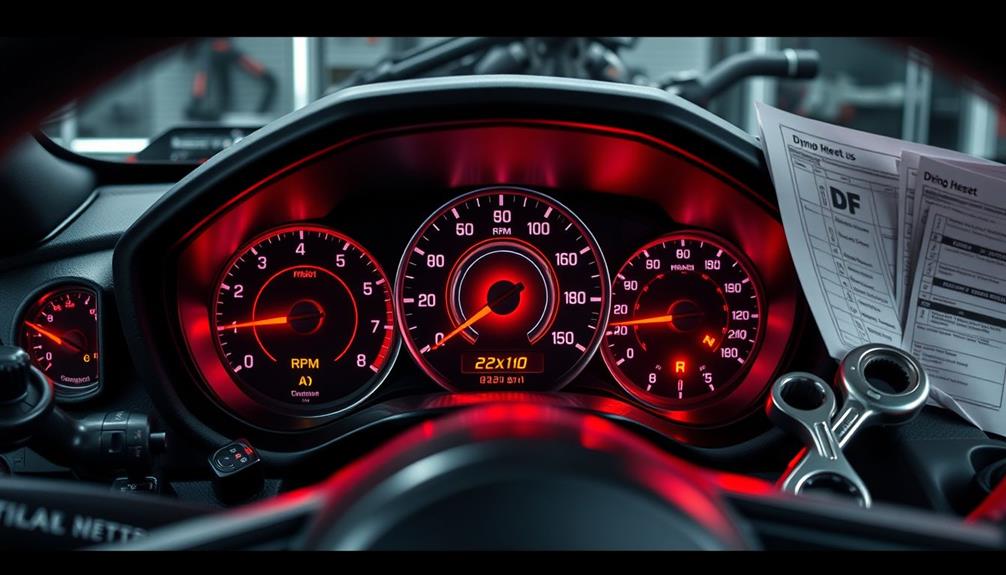
Understanding performance metrics is vital for anyone looking to improve their car tuning efforts. By focusing on the right metrics, you can greatly enhance your vehicle's performance.
Here are three key metrics to keep in mind:
- Horsepower and Torque: These indicators show your engine's power, often improved by 10% to 20% through effective tuning.
- Air-Fuel Ratio (AFR): Maintaining an ideal AFR of around 14.7:1 for gasoline engines is important for combustion efficiency, affecting both performance and emissions.
- Engine RPM: This metric influences the power band and responsiveness, allowing you to adjust the power delivery curve for best performance across various RPM ranges.
When tuning, consider how each of these performance metrics interrelates. For instance, adjusting boost pressure in a turbocharged engine can enhance horsepower but may affect the air-fuel ratio.
Balancing these metrics guarantees you achieve the desired performance without compromising compliance with emissions standards.
Building a Network and Finding Mentorship

Building a strong network and finding mentorship can greatly enhance your journey in car tuning. Start by attending local car meets and automotive workshops, where you'll connect with experienced tuners and industry professionals. These gatherings are golden opportunities for networking and could lead to invaluable mentorship.
Don't overlook online communities; join forums specific to your vehicle make and model. Engaging with seasoned tuners there allows you to ask questions, share experiences, and grow your knowledge.
Additionally, consider seeking out mentoring relationships with retired engineers or experienced tuners willing to guide you through the tuning process.
Social media platforms can also be powerful tools. Follow industry experts, participate in discussions, and join groups focused on car tuning and performance enhancements. This online engagement can further broaden your network.
Lastly, think about enrolling in tuning courses. These often provide not just education but also networking opportunities with instructors and fellow students who share your passion for automotive performance.
Frequently Asked Questions
How to Become a Vehicle Tuner?
To become a vehicle tuner, you need to understand engine mechanics, gain hands-on experience, take structured courses, develop problem-solving skills, and stay updated on industry trends through forums and car meets. Start exploring today!
Where Can I Learn How to Tune Engines?
You're on the brink of a thrilling journey! Immerse yourself in online courses like Evans Performance Academy, explore free resources, and connect with local car meets to ignite your passion for tuning engines and mastering performance.
How to Learn ECU Tuning?
To learn ECU tuning, start by grasping ECU fundamentals, then immerse yourself in tuning software and tools. Join online courses, practice with simple modifications, and stay updated on trends to enhance your skills effectively.
Is It Hard to Learn to Tune a Car?
Learning to tune a car isn't hard if you're willing to put in the effort. With the right resources, hands-on practice, and a supportive community, you can build your skills and confidence effectively.
Conclusion
In the world of car tuning, think of your journey as a finely tuned engine—each skill and experience fuels your growth. Embrace the misconceptions, learn from others, and immerse yourself in practical applications. Just like a car needs the right parts to perform, you need knowledge and connections to master this craft. So, keep your gears turning, build your network, and let your passion drive you forward. Your evolution as a tuner is just the beginning of the ride.
